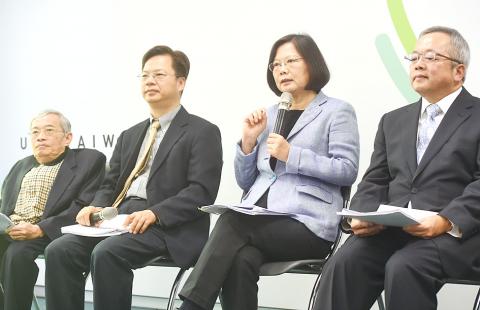The incoming administration is moving to establish a new quasi-sovereign wealth fund with local and overseas cash to finance emerging industries, a top adviser to president-elect Tsai Ing-wen (蔡英文) said yesterday.
According to a plan she is considering, the government would be the largest shareholder in the fund, with ownership at less than 50 percent, while the rest would be comprised of local and foreign investors, said Kung Ming-hsin (龔明鑫), Tsai’s top adviser on industry policy.
The fund would help nurture the development of key industries such as biotechnology and smart machinery, Kung said.

Photo: Chien Jung-fong, Taipei Times
“There is a lot of money in Taiwan, but people are just collecting fixed-interest payments,” said Kung, who is also vice president of the Taiwan Institute of Economic Research (台灣經濟研究院).
“An innovative financing mechanism can make full use of the local excess savings,” he said.
Tsai, who is to take office on May 20 after winning in a landslide in January’s election, campaigned on fostering new industries as economic growth slumps from a global trade slowdown.
The nation is facing increasing pressure to find new engines for growth as Chinese firms become more competitive and demand weakens in the electronics sector, its key export.
The new leadership hopes to keep central government deficit at less than 3 percent of GDP, so it needs to find more innovative ways to fund new industries beyond selling debt, Kung said.
The proposed fund’s investments would focus on five areas highlighted by Tsai’s campaign: “green” energy, biotechnology, national defense, Internet of Things and smart machinery.
While the fund might also acquire fledgling businesses, unlike Singaporean sovereign wealth fund Temasek Holdings Pte, it would not buy large companies.
Kung declined to comment on the size of the fund.
The new company might hire foreign managers, Kung added.
The Cabinet-level National Development Council said in July last year that it would consider forming a sovereign wealth fund, but added that it does not have to include foreign-exchange reserves.
Council Deputy Minister Huan Lin (林桓) this week said exploratory research conducted by the current administration would be passed to Tsai’s government if need be.
The nation’s economy grew 0.75 percent last year, the least since 2009, as exports shrank over the past 12 months.
Local technology firms have declined as demand for PC hardware fell, while those in other nations moved into Internet services.
The five worst performers in Morgan Stanley’s 106-member Asia-Pacific Infotech Index last year came from Taiwan.

CHAOS: Iranians took to the streets playing celebratory music after reports of Khamenei’s death on Saturday, while mourners also gathered in Tehran yesterday Iranian Supreme Leader Ayatollah Ali Khamenei was killed in a major attack on Iran launched by Israel and the US, throwing the future of the Islamic republic into doubt and raising the risk of regional instability. Iranian state television and the state-run IRNA news agency announced the 86-year-old’s death early yesterday. US President Donald Trump said it gave Iranians their “greatest chance” to “take back” their country. The announcements came after a joint US and Israeli aerial bombardment that targeted Iranian military and governmental sites. Trump said the “heavy and pinpoint bombing” would continue through the week or as long

TRUST: The KMT said it respected the US’ timing and considerations, and hoped it would continue to honor its commitments to helping Taiwan bolster its defenses and deterrence US President Donald Trump is delaying a multibillion-dollar arms sale to Taiwan to ensure his visit to Beijing is successful, a New York Times report said. The weapons sales package has stalled in the US Department of State, the report said, citing US officials it did not identify. The White House has told agencies not to push forward ahead of Trump’s meeting with Chinese President Xi Jinping (習近平), it said. The two last month held a phone call to discuss trade and geopolitical flashpoints ahead of the summit. Xi raised the Taiwan issue and urged the US to handle arms sales to

State-run CPC Corp, Taiwan (CPC, 台灣中油) yesterday said that it had confirmed on Saturday night with its liquefied natural gas (LNG) and crude oil suppliers that shipments are proceeding as scheduled and that domestic supplies remain unaffected. The CPC yesterday announced the gasoline and diesel prices will rise by NT$0.2 and NT$0.4 per liter, respectively, starting Monday, citing Middle East tensions and blizzards in the eastern United States. CPC also iterated it has been reducing the proportion of crude oil imports from the Middle East and diversifying its supply sources in the past few years in response to geopolitical risks, expanding

Pro-democracy media tycoon Jimmy Lai’s (黎智英) fraud conviction and prison sentence were yesterday overturned by a Hong Kong court, in a surprise legal decision that comes soon after Lai was jailed for 20 years on a separate national security charge. Judges Jeremy Poon (潘兆初), Anthea Pang (彭寶琴) and Derek Pang (彭偉昌) said in the judgement that they allowed the appeal from Lai, and another defendant in the case, to proceed, as a lower court judge had “erred.” “The Court of Appeal gave them leave to appeal against their conviction, allowed their appeals, quashed the convictions and set aside the sentences,” the judges